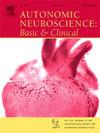从发现到争论:绝经期激素治疗的历史及其对心血管健康的影响
IF 3.3
4区 医学
Q2 NEUROSCIENCES
引用次数: 0
摘要
心血管疾病(CVD)仍然是妇女死亡的主要原因。更年期与多种生理变化有关,包括标志性的血管舒缩症状和心血管疾病的风险增加。传统的激素疗法(HT)是妇女更年期管理的主要形式,直到妇女健康倡议(WHI)试验发现使用激素会增加患心脏病和中风的风险。自2002年WHI发表以来,治疗激素疗法的处方急剧下降并保持在低位,使更年期妇女几乎没有治疗和管理的选择。虽然激素疗法在治疗绝经期症状方面非常有效,但有关心血管益处的数据好坏参半,激素疗法降低心血管疾病风险可能与开始治疗的时间有关。本综述的目的是提供一个明确的激素治疗使用时间表和试验,以全面支持激素治疗作为一种安全有益的绝经妇女策略,重点是倡导继续研究更年期治疗方案,以改善妇女整个生命周期的健康。本文章由计算机程序翻译,如有差异,请以英文原文为准。
From discovery to debate: The history of menopausal hormone therapy and its impact on cardiovascular health
Cardiovascular disease (CVD) continues to be the leading cause of death in women. Menopause is associated with a variety of physiological changes, including hallmark vasomotor symptoms and an increased risk of CVD. Traditional hormone therapy (HT) was the primary form of menopausal management for women until the Women's Health Initiative (WHI) trial found an increased risk of heart disease and stroke with HT use. Since the WHI publication in 2002, prescriptions for HT have plummeted and remained low, leaving menopausal women with few options for treatment and management. Although HT is very effective at treating menopausal symptoms, the data regarding cardiovascular benefits have been mixed, and reduction in CVD risk with HT may be related to the timing of initiation. The purpose of this review is to provide a clear timeline of HT usage and trials in overall support of HT as a safe and beneficial strategy for menopausal women, with an emphasis on advocacy for continued research on menopausal treatment options to improve women's health across the lifespan.
求助全文
通过发布文献求助,成功后即可免费获取论文全文。
去求助
来源期刊
CiteScore
5.80
自引率
7.40%
发文量
83
审稿时长
66 days
期刊介绍:
This is an international journal with broad coverage of all aspects of the autonomic nervous system in man and animals. The main areas of interest include the innervation of blood vessels and viscera, autonomic ganglia, efferent and afferent autonomic pathways, and autonomic nuclei and pathways in the central nervous system.
The Editors will consider papers that deal with any aspect of the autonomic nervous system, including structure, physiology, pharmacology, biochemistry, development, evolution, ageing, behavioural aspects, integrative role and influence on emotional and physical states of the body. Interdisciplinary studies will be encouraged. Studies dealing with human pathology will be also welcome.

 求助内容:
求助内容: 应助结果提醒方式:
应助结果提醒方式:


